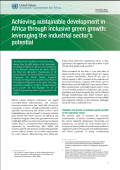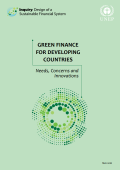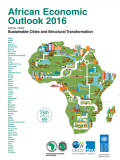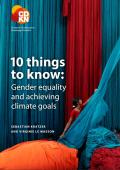
This policy brief is the fifth in a series of six briefs drawn from the fifth edition of the Sustainable Development Report on Africa, a joint publication of the Economic Commission for Africa (ECA), the Food and Agriculture Organization of the United Nations, the United Nations Environment Programme, the United Nations Industrial Development Organization and the United Nations Development Programme on the theme “achieving sustainable development in Africa through inclusive green growth”. The brief highlights the role of industry in promoting inclusive green growth in the region.

Green finance is a strategy for financial sector and broader sustainable development that is relevant around the world. But the context differs considerably for different countries. Developing countries, notably those with underdeveloped financial systems, face particular challenges in financing national development priorities.
Broadly, concern and action to align financing to sustainable development is concentrated in three areas:

The African Economic Outlook (AEO) 2016 presents the current state of economic and social development in Africa and projects the outlook for the coming two years. The AEO is a product of collaborative work by three international partners: the African Development Bank, the OECD Development Centre and the United Nations Development Programme.
The AEO 2016 shows that the continent is performing well in regard to economic, social and governance issues and has encouraging prospects for the near future. With its special theme on sustainable cities and structural transformation, this edition looks closely at Africa’s distinctive pathways towards urbanisation and at how this is increasingly shifting economic resources towards more productive activities.
In many regulated markets, private, third-party auditors are chosen and paid by the firms that they audit, potentially creating a conflict of interest. This article reports on a two-year field experiment in the Indian state of Gujarat that sought to curb such a conflict by altering the market structure for environmental audits of industrial plants to incentivize accurate reporting. There are three main results. First, the status quo system was largely corrupted, with auditors systematically reporting plant emissions just below the standard, although true emissions were typically higher. Second, the treatment caused auditors to report more truthfully and very significantly lowered the fraction of plants that were falsely reported as compliant with pollution standards. Third, treatment plants, in turn, reduced their pollution emissions. The results suggest reformed incentives for third-party auditors can improve their reporting and make regulation more effective.
The policy summary for this paper is available here.

Although climate change and poverty are increasingly recognised as interlinked global problems, responses often focus on their scientific and economic dimensions only. This research study highlights the advantages and challenges of pursuing climate compatible development, i.e. inclusive green growth, from a gender perspective, pulling in evidence from projects in Asia, Africa and Latin America. The field work focused particularly on urban environments, as there is a relative paucity of data from cities, compared to rural areas.
While international frameworks are gradually becoming more aware of gender issues, all too often gender is simply “added” to existing policies. Women’s views, needs and participation are frequently excluded from climate change responses and development initiatives. Moreover women are often perceived as victims with little consideration for the contribution and leadership they could provide in adaptation and mitigation efforts.
A comparative study of gender approaches in climate compatible development initiatives in Peru, Kenya and India asked:
